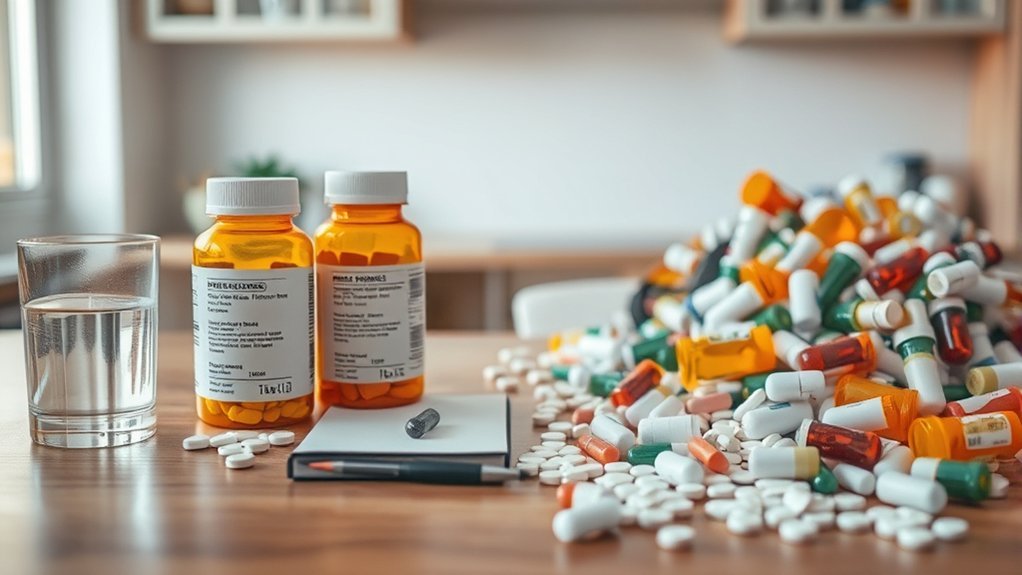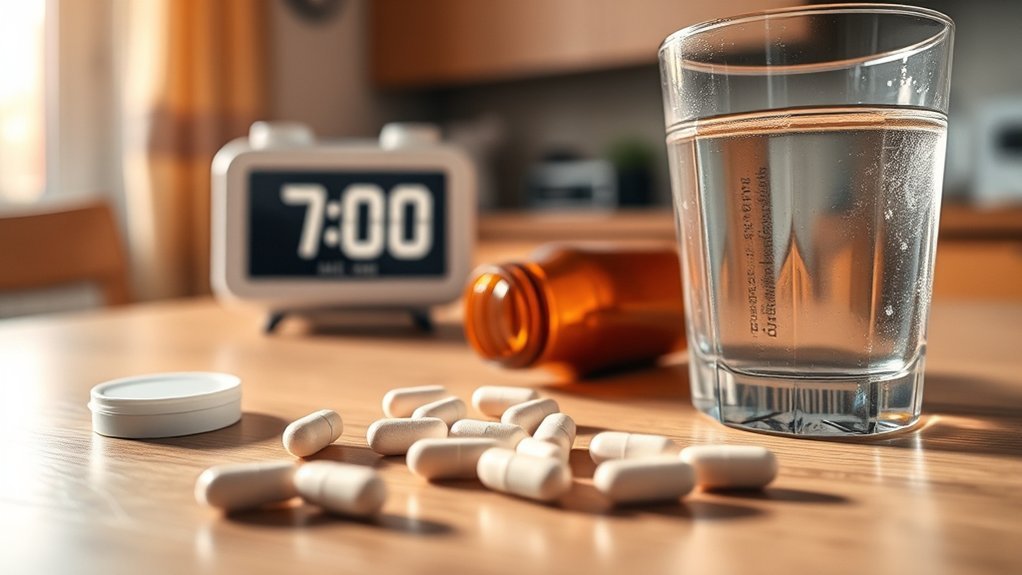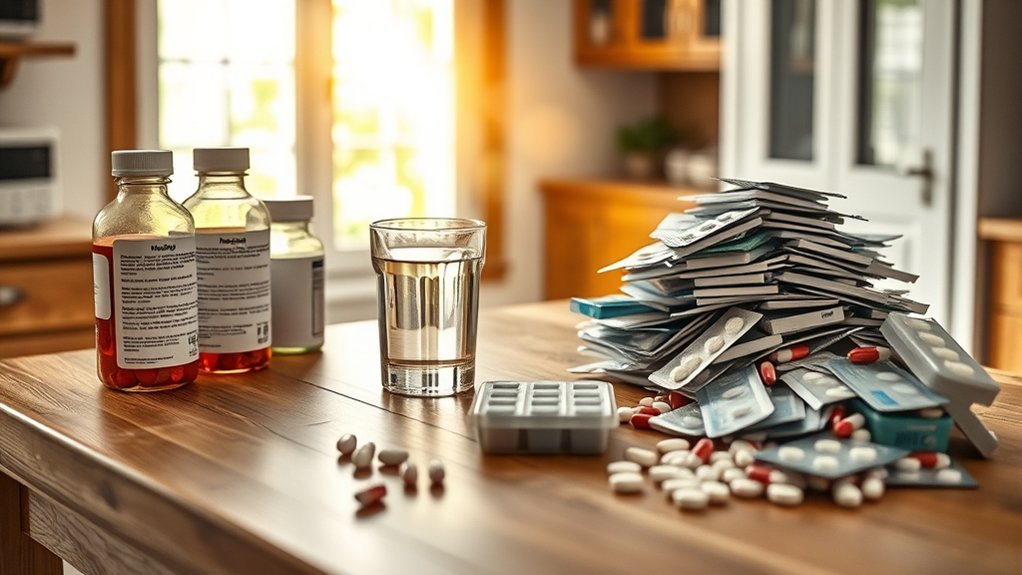Imagine you’ve just been prescribed a new medication for your chronic pain, but you forget to ask about potential side effects. This oversight could lead to unexpected reactions that might complicate your treatment. To avoid such pitfalls, it’s essential to understand safe medication practices. From effective communication with your healthcare provider to proper storage and disposal, knowing the do’s and don’ts can make all the difference in your health journey.
Understanding Your Medications

How well do you really understand your medications? Knowing what each medication does is essential for your health. Take the time to read the labels and patient information leaflets. Familiarize yourself with the purpose, dosage, and potential side effects.
Ask yourself if you know how to take your medications correctly—some need to be taken with food, while others should be taken on an empty stomach. It’s also important to recognize any interactions with other drugs, supplements, or even certain foods.
Keep track of your medications in a journal or using an app, and always stay aware of any changes in how you feel. Understanding your medications empowers you to make informed decisions about your health.
Communicating With Healthcare Providers

Effective communication with your healthcare providers is essential for managing your medications and overall health. When you engage openly, you empower both yourself and your provider to make informed decisions.
Here are some tips to enhance your communication:
- Be honest about your symptoms and concerns.
- Ask questions if you don’t understand something; it’s your right to know.
- Share your medication history, including any allergies or side effects.
- Keep a list of all medications, including over-the-counter drugs and supplements.
- Follow up on any instructions or changes to your treatment plan.
Following Dosage Instructions

Following dosage instructions is essential for ensuring your medications work effectively and safely. Always take your medication exactly as prescribed by your healthcare provider. This means adhering to the correct dosage, timing, and method of administration.
Don’t skip doses or double up to make up for missed ones, as this can lead to adverse effects. If you’re unsure about the instructions, ask your healthcare provider or pharmacist for clarification.
Keep track of your medications, using a pill organizer or medication diary if needed. Avoid altering the dosage without consulting your doctor, as it may compromise treatment.
Recognizing Side Effects and Interactions
When taking medications, it’s essential to recognize common side effects and understand potential drug interactions.
Staying aware of how different medications may affect each other can help you avoid serious complications.
Always report any adverse reactions to your healthcare provider to guarantee your safety.
Common Side Effects
Recognizing common side effects is vital for anyone taking medications. Being aware helps you respond appropriately and maintain your health.
Here are some typical side effects you might encounter:
- Nausea or upset stomach
- Drowsiness or fatigue
- Dizziness or lightheadedness
- Allergic reactions like rash or itching
- Changes in appetite or weight
If you notice any of these effects, don’t ignore them. It’s important to consult your healthcare provider for guidance.
They can help determine if the side effects are manageable or if you need to adjust your medication. Keeping track of your symptoms guarantees that you can maintain a safe and effective medication regimen.
Always communicate openly about any changes you experience while on medication.
Drug Interactions Awareness
While being aware of common side effects is important, understanding drug interactions can greatly impact your health. Drug interactions occur when two or more medications influence each other’s effectiveness or increase side effects.
You should always inform your healthcare provider about all medications you’re taking, including over-the-counter drugs and supplements. This helps them identify potential interactions.
Pay attention to how you feel when starting a new medication; unusual symptoms can signal an interaction. Read medication labels for warnings about specific combinations.
It’s vital to follow your doctor’s instructions regarding dosages and timing. By staying informed and proactive, you can help prevent adverse effects and guarantee your medications work effectively together.
Always prioritize open communication with your healthcare team.
Reporting Adverse Reactions
Understanding how to report adverse reactions is crucial for ensuring your safety while on medication. Recognizing side effects and interactions can help you communicate effectively with your healthcare provider. Here’s what you should do:
- Monitor your symptoms: Keep track of any unusual feelings or changes in your health.
- Note the timing: Record when the symptoms started in relation to starting the medication.
- Gather details: Take note of the dosage and any other medications you’re taking.
- Report promptly: Don’t hesitate to contact your doctor or pharmacist about your concerns.
- Follow up: Keep a dialogue open to adjust your treatment as necessary.
Your proactive approach can make a significant difference in your health outcomes.
Storing Medications Safely
To guarantee your medications remain effective and safe, storing them properly is essential. Always keep medications in their original containers, away from direct sunlight and moisture. A cool, dry place is ideal for most medications.
| Storage Condition | Example Medications |
|---|---|
| Room Temperature | Tablets, Capsules |
| Refrigerated | Insulin, Certain Antibiotics |
| Freezer | Some Vaccines |
Avoid storing medications in bathrooms, as humidity can compromise their effectiveness. Always keep them out of reach of children and pets. Check expiration dates regularly, and don’t hesitate to consult your pharmacist if you have questions about specific storage needs for your medications. Safe storage helps guarantee your health and well-being.
Disposing of Medications Properly
When it comes to disposing of medications, you need to be aware of their environmental impact.
Proper disposal methods help prevent contamination of water sources and reduce harm to wildlife.
Let’s explore the best practices for getting rid of unused or expired medications safely.
Environmental Impact Awareness
While you may think it’s just a matter of tossing old medications in the trash, improper disposal can greatly harm the environment.
When medications enter landfills or water systems, they can contaminate soil and drinking water, posing risks to wildlife and human health. It’s essential to be aware of the environmental impact of your actions.
Here are some key points to keep in mind:
- Medications can leach harmful chemicals into the ground.
- Aquatic life is affected when drugs enter water sources.
- Contaminated water can impact human health.
- Wildlife may suffer from ingestion of these substances.
- Proper disposal helps protect ecosystems.
Being mindful of how you dispose of medications not only benefits you but also safeguards the environment for future generations.
Safe Disposal Methods
Properly disposing of medications is essential for both your health and the environment. When you have unused or expired medications, don’t just throw them in the trash or flush them down the toilet.
Instead, check if your community has a take-back program or designated collection sites. These programs guarantee safe disposal and prevent drugs from contaminating water sources.
If these options aren’t available, mix your medications with an undesirable substance like dirt or used coffee grounds, seal them in a container, and throw them in the trash.
Always remove personal information from prescription labels before disposal to protect your privacy.
Frequently Asked Questions
Can I Take Expired Medications Safely?
You shouldn’t take expired medications. They may lose effectiveness or even become harmful. Always check expiration dates, and consult your healthcare provider if you’re unsure about using any medication past its expiration. Stay safe!
What Should I Do if I Miss a Dose?
If you miss a dose, take it as soon as you remember, unless it’s almost time for your next dose. Don’t double up; just continue with your regular schedule. Always consult your healthcare provider for advice.
Can I Share My Medications With Others?
No, you shouldn’t share your medications with others. Everyone’s health needs are different, and sharing can lead to harmful side effects or ineffective treatment. Always consult a healthcare professional before considering any medication changes.
Are Over-The-Counter Medications Always Safe?
Over-the-counter medications might seem like candy, but they’re not always safe. You should read labels carefully and consult with a healthcare professional to guarantee they’re right for you and won’t cause unwanted side effects.
How Do I Know if a Medication Is Right for Me?
To determine if a medication’s right for you, consult your doctor or pharmacist. Discuss your health history, current medications, and any allergies. They’ll help you evaluate potential benefits and risks tailored to your needs.
Conclusion
In the domain of safe medication practices, it’s essential to stay informed and proactive. By understanding your medications, communicating openly with your healthcare provider, and following dosage instructions, you’re setting yourself up for success. Remember, a stitch in time saves nine—recognizing side effects and storing medications properly can prevent bigger issues down the line. Finally, always dispose of unused medications responsibly. By taking these steps, you’ll protect not just your health, but also the environment.
